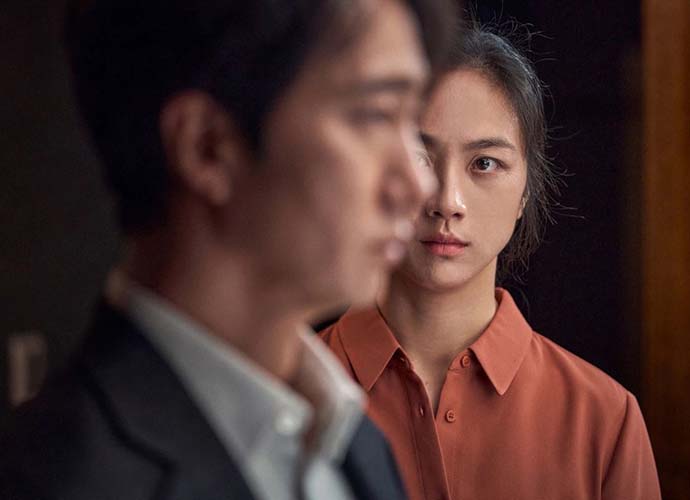‘Decision To Leave’ Movie Review: A Beautiful, Thrilling Romance That Could Make Even Hitchcock Blush

4.5/5
Decision to Leave is the latest film from South Korean filmmaker Park Chan-wook, the same director of some truly amazing movies like Oldboy, Thirst and The Handmaiden (the last one being my favorite from this director).
It stars Tang Wei and Park Hae-il and it tells a surprisingly tender, yet dangerous love story between Park, a police detective who is only driven by his obsession with solving murder cases, and Wei, a mysterious Chinese-born immigrant with very ambiguous goals and motivations.
Chan-wook won the Best Director award at the Cannes Film Festival for the movie, and it’s clear why because the directing is easily the best part of this film. The actual look and presentation of Decision to Leave are just mesmerizing. The way the film communicates not just its characters, but how it presents them and how they choose to interact with each other proves why Park is a master of his craft. The way he sets up his angles, the shots he chooses to focus on, and more importantly the specific moments where he chooses not to focus on, the sudden zoom-in to characters, the incredibly creative ways Park chooses to transition between scenes, everything conveys something to the audience and adds something unique to plot.
Just something as simple as two people texting each other is presented in such a fascinating and interesting way: it not only communicates the necessary information in a manner that the audience can understand, but it’s also communicated in such a stylish way that it keeps them engaged as well. There are so many moments like this where the film takes a compelling approach, like how the main detective character spies on people, that if this same movie was made by a less competent director, it wouldn’t reach the same level of impact that Park is able to hit.
Additionally, there are several moments throughout the film where certain aspects of the frame become blurry while the center of focus becomes hyper-detailed, and while some directors may utilize this technique for purely aesthetic purposes, Park uses it to emphasize what is important and what isn’t. By focusing on one specific thing, Park is not only able to prioritize what is the most important on screen, but it also helps us understand what the characters themselves believe to be the most important.
Considering that the main character is a police detective, a lot of insight is provided regarding how his mind works: how he solves cases, how he goes about interrogating suspects, how he stops suspects from escaping. He has a very specific process that makes him a successful detective, and the way this movie is filmed helps complement what this character is thinking. There are just so many ways that a less experienced director would have told this story and followed this character in a bland manner, but the way Park tells this story and the moments he chooses to focus on or the way he chooses to film certain scenes helps elevate not just the story, but the characters as well.
This is easily one of the best-looking films of the year. Every single frame of this movie is not only gorgeous to look at, but all have some level of importance that either gets reincorporated in the movie or helps it stand out in a rewatch. It’s clear that a lot of effort was given to make this film look as great as it does, as every single scene whether it be landscape shots of the mountain or beaches, quieter moments where characters are just talking and making conversation, or the more intense scenes of action and thrill, everything gets treated equally, and so every frame gets the same level of polish and detail. This is a movie that rewards both multiple viewings and attention to detail, and I think many viewers like myself will get even more out of it in a second or third watch.
However, outside of the technical aspects of Decision to Leave, there are a number of other elements that this film offers that are exceptional. For example, all the acting was first-rate with Tang Wei giving the best performance in the entire film. Throughout the film, the audience is very much kept in the dark in terms of what Wei’s character is about to do or what her motivation is for doing or not doing something. She plays this very manipulative, almost femme fatale-type character where the audience is not exactly sure if she’s being 100% honest or if she truly means what she means. Wei is truly Oscar-worthy, and hopefully, she is considered to be a potential nomination for Best Actress at the nAcademy Awards.
Park Hae-il also gave a fantastic performance as he was able to believably pull off both the hardboiled intelligent detective and the ditzy lovestruck romantic. His character is the heart and soul of the film, and without a talented actor giving such a great performance, the movie would simply fall apart.
While there are some minor issues with the film, the most pertinent being that the film is a bit too long and could have slightly trimmed off its runtime, these are still very minor, nitpicking issues that do not take anything away from the masterful experience that is Decision to Leave. The film is another masterpiece of director Park Chan-wook and is one of the best films of this year.
RELATED ARTICLES
Get the most-revealing celebrity conversations with the uInterview podcast!






Leave a comment